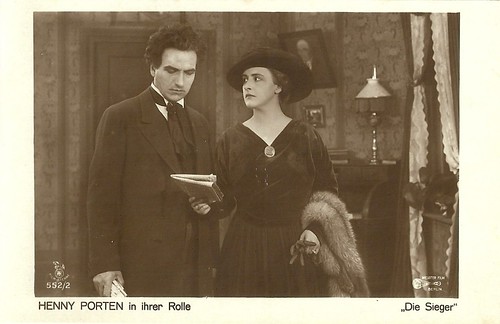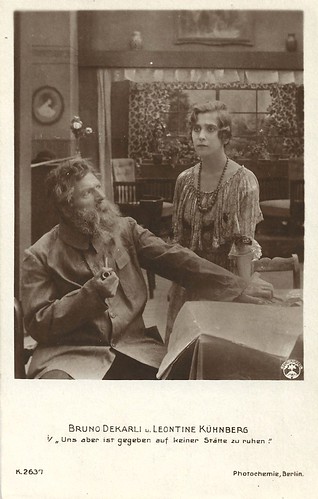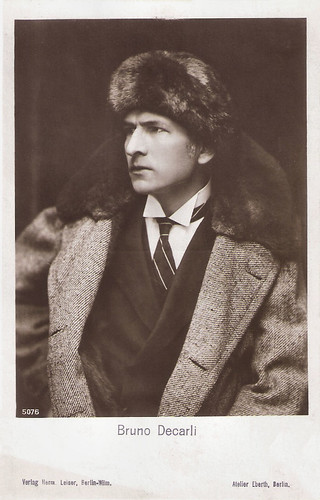German actor Bruno Decarli (1877-1950) had a short, but intensive career in silent cinema. He often appeared as the co-star of Mia May and Henny Porten.

German postcard by NPG, no. 862. Photo: Anny Eberth, Berlin.

German postcard in the Film Sterne series by Rotophot., no. 503/5. Photo: May-Film. Mia May and Bruno Decarli in Die Silhouette des Teufels/The Silhouette of the Devil (Felix Basch, 1917), produced and scripted by Joe May.

German postcard in the Film-Sterne series by Rotophot., no. 525/8. Photo: Messter-Film. Henny Porten and Bruno Decarli in Das Geschlecht derer von Ringwall/The race of those of Ringwall (Rudolf Biebrach, 1918).

German postcard in the Film-Sterne series by Rotophot., no. 541/6. Photo: Messter-Film. Henny Porten, Bruno Decarli and Walfried Mellin in Das Maskenfest des Lebens/The Masquerade of Life (Rudolf Biebrach, 1918).

German postcard in the Film-Sterne series by Rotophot., no. 525/2. Photo: Messter-Film. Henny Porten and Bruno Decarli in Die Sieger/The winners (Rudolf Biebrach, 1918).

German postcard by Photochemie, Berlin, no. K. 3024. Photo: Mac Walten, Berlin.
Bruno Decarli was born in Dresden, Germany in 1877. He was the son of the chamber singer Eduard Decarli (actually Eduard Schmidt).
Bruno made his theatre debut in 1895 in Meiningen. A year later, he went to Zurich, and then he came over Gera, Dresden, and Berlin to the Leipzig City Theatre in 1908. He would continue to work there till the beginning of World War I. In 1915 Max Reinhardt engaged him for the Deutsche Theater in Berlin.
The following year, Decarli began his film work. Among his first silent films were the drama Die Nixenkönigin/The Mermaid Queen (Louis Neher, 1916) with Rita Sacchetto, Der Mann im Spiegel /The Man in the Mirror (Conrad Wiene, Robert Wiene, 1916), and Das Leben ein Traum/The Life a Dream (Robert Wiene, 1916) with Emil Jannings.
He worked for director Robert Wiene at the Messter Studio in such films as Furcht/Fear (Robert Wiene, 1917) with Conrad Veidt. He played mostly leading roles in dramas, thrillers and melodramas. Several times he had the stars Mia May and Henny Porten as his partners. With May he appeared in films by her husband like Die Silhouette des Teufels/The Silhouette of the Devil (Joe May, 1917).
With Porten, he co-starred in the Honoré de Balzac adaptation Das Maskenfest des Lebens/The Masquerade of Life (Rudolf Biebrach, 1918) and Die Heimkehr des Odysseus/The Homecoming of Odysseus (Rudolf Biebrach, 1918). This delightful comedy takes as its inspiration the famous Penelope episode from Homer's Odyssey and transplants it to the present-day Bavarian Alps. Although the situations are played as comedy, the echo of real-life circumstances with men missing in action or held in prisoner-of-war camps during World War I resonated with audiences. Josepha (Porten), who must fend for herself in the absence of her husband (Decarli), yet always remains faithful to him, can be seen as a kind of model for contemporary women, encouraging them to follow her example.

German postcard. Photo: Hofphotograph Hahn Nachf., Dresden. Bruno Decarli in the stage play 'Braut von Messina' (The Bride of Messina) by Friedrich Schiller.

German postcard. Photo: Hofphotograph Hahn Nachf., Dresden. Bruno Decarli in the stage play 'Die Piccolomini' (The Piccolomini) by Friedrich Schiller. The play is a part of the trilogy 'Wallenstein'. Schiller completed the trilogy in 1799.

German postcard by Kunsthandlung Hermann Vogel, Leipzig / A & M B, no. V 268. Photo: Hofatelier Pieperhof, Leipzig. Bruno Decarli as a young Napoleon Bonaparte, is unclear in which stage play.

German postcard by Verlag Hermann Leiser, Berlin, no. 9143. Photo: Fritz Richard. Bruno Decarli as Robespierre in the play 'Dantons Tod' (Danton's Death) by Georg Büchner.

German postcard by Verl. Herm. Leiser, Berlin-Wilm., no. 5542. Caption: Bruno Decarli at home.
At the end of World War I, Bruno Decarli had his own film series. He often worked for director Richard Eichberg as in Jettatore (1919) with Lee Parry and Violetta Napierska. One of his best-known productions was the adventure serial Die Herrin der Welt/Mistress of the World (Joseph Klein, Joe May, 1919) starring Mia May.
Another popular film in which he appeared was the two-part Fridericus Rex (Arzén von Cserépy, 1922) featuring Otto Gebühr. That year he also appeared in the Dutch production De bruut/The Brute (Theo Frenkel, 1922) with Willem van der Veer and Adolphe Engers. In the Alexandre Dumas père adaptation Der Mann mit der eisernen Maske/The Man with the Iron Mask (Max Glass, 1923), he co-starred with Albert Bassermann.
Interesting is also the comedy Ein Glas Wasser/One Glass of Water (Ludwig Berger, 1923) with Mady Christians. In these years, Decarli was also active as a director and producer. One of his productions was Brigantenrache/Brigands Revenge (Reinhard Bruck, 1922) starring Asta Nielsen.
In 1923 Decarli returned to the stage. He played almost exclusively at the Saxon State theatres in Dresden until all German theatres closed in the summer of 1944. He did little film work. In 1940 he had a small part in the Zarah Leander vehicle Das Herz der Königin/The Heart of a Queen (Carl Froelich, 1940).
Bruno Decarli had his last, small film role in a Nazi-propaganda and anti-British production. After 1945, he remained unemployed. He died in 1950 in Tiverton, Great Britain, at the home of his eldest daughter. He was 73.

German collectors card by Ross Verlag in the series Vom Werden Deutscher Filmkunst - Der Stumme Film, picture no. 30, Group 40. Photo: Frankfurter Film-Co. Publicity still for Rebellenliebe/Rebel Love (Karl Heiland, 1919).

German postcard by Photochemie, Berlin, no. K.2637. Photo: Eichberg-Film. Bruno Decarli and Leontine Kühnberg in Uns aber ist gegeben auf keiner Stätte zu ruhen (1918). While the film title Uns aber ist gegeben auf keiner Stätte zu ruhen [But to us, it is given to rest on no place] is absent on IMDb and the German site Filmportal, from the six films that Richard Eichberg directed with Leontine Kühnberg in 1918, all for his own company Eichberg-Film, a probable option is Im Zeichen der Schuld (Eichberg, 1918), aka Aus dem Leben eines Vorbestraften [From the life of a convicted man]. Filmportal lists this as the only film in which Decarli and Kühnberg played together in a film by Eichberg-Film. The plot deals with a man (Decarli) who, convicted of forging his boss's name, kills the bank director and assumes his identity. However, the Early German Film Database does list the film Uns aber ist gegeben, auf keiner Stätte zu ruhen as a separate film (1918), directed by Eichberg, and starring Decarli and Kühnberg. So perhaps, this is a separate film after all.

German postcard by Verlag Hermann Leiser, Berlin, no. 2152 (?). Photo: Becker & Maass, Berlin.

German postcard by Verlag Hermann Leiser, Berlin, no. 5076. Photo: Atelier Eberth, Berlin.

German postcard by Verlag Hermann Leiser, Berlin, no. 8977. Photo: Becker & Maass, Berlin.

German postcard by Photochemie, Berlin, no. K. 1532. Photo: Willinger.

German postcard by Photochemie, Berlin, no. K. 1582. Photo: Alex Binder, Berlin.

German postcard by Photochemie, Berlin, no. K. 1584. Photo: Alex Binder, Berlin.

German postcard in the Film-Sterne series by Rotophot., no. 217/1. Photo: Becker & Maass, Berlin.
Sources: Stephanie D’heil (Steffi-Line), Thomas Staedeli (Cyranos), Wikipedia (German), and IMDb.
This post was last updated on 8 December 2023.

German postcard by NPG, no. 862. Photo: Anny Eberth, Berlin.

German postcard in the Film Sterne series by Rotophot., no. 503/5. Photo: May-Film. Mia May and Bruno Decarli in Die Silhouette des Teufels/The Silhouette of the Devil (Felix Basch, 1917), produced and scripted by Joe May.

German postcard in the Film-Sterne series by Rotophot., no. 525/8. Photo: Messter-Film. Henny Porten and Bruno Decarli in Das Geschlecht derer von Ringwall/The race of those of Ringwall (Rudolf Biebrach, 1918).

German postcard in the Film-Sterne series by Rotophot., no. 541/6. Photo: Messter-Film. Henny Porten, Bruno Decarli and Walfried Mellin in Das Maskenfest des Lebens/The Masquerade of Life (Rudolf Biebrach, 1918).

German postcard in the Film-Sterne series by Rotophot., no. 525/2. Photo: Messter-Film. Henny Porten and Bruno Decarli in Die Sieger/The winners (Rudolf Biebrach, 1918).

German postcard by Photochemie, Berlin, no. K. 3024. Photo: Mac Walten, Berlin.
Odyssey in the Bavarian Alps
Bruno Decarli was born in Dresden, Germany in 1877. He was the son of the chamber singer Eduard Decarli (actually Eduard Schmidt).
Bruno made his theatre debut in 1895 in Meiningen. A year later, he went to Zurich, and then he came over Gera, Dresden, and Berlin to the Leipzig City Theatre in 1908. He would continue to work there till the beginning of World War I. In 1915 Max Reinhardt engaged him for the Deutsche Theater in Berlin.
The following year, Decarli began his film work. Among his first silent films were the drama Die Nixenkönigin/The Mermaid Queen (Louis Neher, 1916) with Rita Sacchetto, Der Mann im Spiegel /The Man in the Mirror (Conrad Wiene, Robert Wiene, 1916), and Das Leben ein Traum/The Life a Dream (Robert Wiene, 1916) with Emil Jannings.
He worked for director Robert Wiene at the Messter Studio in such films as Furcht/Fear (Robert Wiene, 1917) with Conrad Veidt. He played mostly leading roles in dramas, thrillers and melodramas. Several times he had the stars Mia May and Henny Porten as his partners. With May he appeared in films by her husband like Die Silhouette des Teufels/The Silhouette of the Devil (Joe May, 1917).
With Porten, he co-starred in the Honoré de Balzac adaptation Das Maskenfest des Lebens/The Masquerade of Life (Rudolf Biebrach, 1918) and Die Heimkehr des Odysseus/The Homecoming of Odysseus (Rudolf Biebrach, 1918). This delightful comedy takes as its inspiration the famous Penelope episode from Homer's Odyssey and transplants it to the present-day Bavarian Alps. Although the situations are played as comedy, the echo of real-life circumstances with men missing in action or held in prisoner-of-war camps during World War I resonated with audiences. Josepha (Porten), who must fend for herself in the absence of her husband (Decarli), yet always remains faithful to him, can be seen as a kind of model for contemporary women, encouraging them to follow her example.

German postcard. Photo: Hofphotograph Hahn Nachf., Dresden. Bruno Decarli in the stage play 'Braut von Messina' (The Bride of Messina) by Friedrich Schiller.

German postcard. Photo: Hofphotograph Hahn Nachf., Dresden. Bruno Decarli in the stage play 'Die Piccolomini' (The Piccolomini) by Friedrich Schiller. The play is a part of the trilogy 'Wallenstein'. Schiller completed the trilogy in 1799.

German postcard by Kunsthandlung Hermann Vogel, Leipzig / A & M B, no. V 268. Photo: Hofatelier Pieperhof, Leipzig. Bruno Decarli as a young Napoleon Bonaparte, is unclear in which stage play.

German postcard by Verlag Hermann Leiser, Berlin, no. 9143. Photo: Fritz Richard. Bruno Decarli as Robespierre in the play 'Dantons Tod' (Danton's Death) by Georg Büchner.

German postcard by Verl. Herm. Leiser, Berlin-Wilm., no. 5542. Caption: Bruno Decarli at home.
Nazi Propaganda
At the end of World War I, Bruno Decarli had his own film series. He often worked for director Richard Eichberg as in Jettatore (1919) with Lee Parry and Violetta Napierska. One of his best-known productions was the adventure serial Die Herrin der Welt/Mistress of the World (Joseph Klein, Joe May, 1919) starring Mia May.
Another popular film in which he appeared was the two-part Fridericus Rex (Arzén von Cserépy, 1922) featuring Otto Gebühr. That year he also appeared in the Dutch production De bruut/The Brute (Theo Frenkel, 1922) with Willem van der Veer and Adolphe Engers. In the Alexandre Dumas père adaptation Der Mann mit der eisernen Maske/The Man with the Iron Mask (Max Glass, 1923), he co-starred with Albert Bassermann.
Interesting is also the comedy Ein Glas Wasser/One Glass of Water (Ludwig Berger, 1923) with Mady Christians. In these years, Decarli was also active as a director and producer. One of his productions was Brigantenrache/Brigands Revenge (Reinhard Bruck, 1922) starring Asta Nielsen.
In 1923 Decarli returned to the stage. He played almost exclusively at the Saxon State theatres in Dresden until all German theatres closed in the summer of 1944. He did little film work. In 1940 he had a small part in the Zarah Leander vehicle Das Herz der Königin/The Heart of a Queen (Carl Froelich, 1940).
Bruno Decarli had his last, small film role in a Nazi-propaganda and anti-British production. After 1945, he remained unemployed. He died in 1950 in Tiverton, Great Britain, at the home of his eldest daughter. He was 73.

German collectors card by Ross Verlag in the series Vom Werden Deutscher Filmkunst - Der Stumme Film, picture no. 30, Group 40. Photo: Frankfurter Film-Co. Publicity still for Rebellenliebe/Rebel Love (Karl Heiland, 1919).

German postcard by Photochemie, Berlin, no. K.2637. Photo: Eichberg-Film. Bruno Decarli and Leontine Kühnberg in Uns aber ist gegeben auf keiner Stätte zu ruhen (1918). While the film title Uns aber ist gegeben auf keiner Stätte zu ruhen [But to us, it is given to rest on no place] is absent on IMDb and the German site Filmportal, from the six films that Richard Eichberg directed with Leontine Kühnberg in 1918, all for his own company Eichberg-Film, a probable option is Im Zeichen der Schuld (Eichberg, 1918), aka Aus dem Leben eines Vorbestraften [From the life of a convicted man]. Filmportal lists this as the only film in which Decarli and Kühnberg played together in a film by Eichberg-Film. The plot deals with a man (Decarli) who, convicted of forging his boss's name, kills the bank director and assumes his identity. However, the Early German Film Database does list the film Uns aber ist gegeben, auf keiner Stätte zu ruhen as a separate film (1918), directed by Eichberg, and starring Decarli and Kühnberg. So perhaps, this is a separate film after all.

German postcard by Verlag Hermann Leiser, Berlin, no. 2152 (?). Photo: Becker & Maass, Berlin.

German postcard by Verlag Hermann Leiser, Berlin, no. 5076. Photo: Atelier Eberth, Berlin.

German postcard by Verlag Hermann Leiser, Berlin, no. 8977. Photo: Becker & Maass, Berlin.

German postcard by Photochemie, Berlin, no. K. 1532. Photo: Willinger.

German postcard by Photochemie, Berlin, no. K. 1582. Photo: Alex Binder, Berlin.

German postcard by Photochemie, Berlin, no. K. 1584. Photo: Alex Binder, Berlin.

German postcard in the Film-Sterne series by Rotophot., no. 217/1. Photo: Becker & Maass, Berlin.
Sources: Stephanie D’heil (Steffi-Line), Thomas Staedeli (Cyranos), Wikipedia (German), and IMDb.
This post was last updated on 8 December 2023.
No comments:
Post a Comment